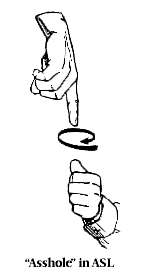It was my first day on assignment at the refinery and I walked into the control room, escorted by a fellow engineer who was showing me around. We approached one of the operators and, before my host could speak, the man said, “Who’s this c#@t?” I laughed and was not fazed a bit, for several reasons. First, I had spent a lot of time in refineries by then, so swearing was not unusual and my skin was thick. Second, this was Australia, so, as in the U.K., the c-word is not meant to be as offensive as in the U.S. And finally, this man had never met me, so I knew exactly what this brief sentence really meant – “We’ve worked hard here to get this unit running well, so don’t come in here and disrespect us and screw things up.” That operator was one of the best, and became one of my strongest allies in that plant.
I’m as guilty as anyone (more-so, really) of letting expletives fly during times of frustration, or perhaps when present company allows for complete openness. But why do we swear, and how do we know that are intentions will be understood? So many people, more virtuous than I, are quick to dismiss swearing as base and a sign of ignorance, but there seems to be much more to it.
The urge to swear is universal, crossing over into all cultures and languages. Natalie Angier, in her article entitled Almost Before We Spoke, We Swore, cites examples of swearing throughout history, dating back to the earliest writings 5000 years ago. She also references colorful language used by Shakespeare, and even presents a quotation from the King James version of the bible – “…hath he not sent me to the men which sit on the wall, that they may eat their own dung, and drink their own piss…”(II Kings 18:27). Chimpanzees, she continues, also exhibit vocal tirades during confrontations as an alternative to physical attacks.
Timothy Jay, a psychology researcher and author, claims that we use swear words 0.3% to 0.7% of the time, which is small, but it is significant when you consider that common personal pronouns (e.g. I, we, you, he, she, it, they, etc.) occur about 1% of the time in speech. According John Grohol, also a psychology researcher, we tend to swear more when among friends, and it is more common for people who are extroverted and for people with Type-A personalities. Also, men are more likely to swear than women. Even American Sign Language (ASL) is rich with a complete offering of gestures for swearing, as described in this Wikipedia® article and shown in this Youtube® video.
Apparently, the main reason we swear is to express emotion, according to this ABC News video featuring Timothy Jay. Our expressions of frustration, anger, and passion seem to be particularly amplified when we add a swear word for emphasis. It’s also plausible that swearing can be useful in persuasion, as discussed by Jeremy Bean, author of PsyBlog. He says, “Light swearing at the start or end of a persuasive speech can help influence an audience.” Finally, studies showing that swearing can reduce our sense of pain are cited by John Grohol, and also in another article entitled Swearing in small doses can reduce physical pain, research finds. In the piece from ABC News, swearing is said to relieve tension by providing a cathartic release.
This leads us to a common theme in my essays, which is our behavior has a substantial physiological connection. This article, quoting information from the book Blue Streak by Richard Dooling, cites research indicating that swearing comes from a different part of the brain than normal speech. This same research is referenced in another article on linguistic phonology that explains that language resides in the left side of the brain, while swearing originates in the Supplementary Motor Cortex in the center of the brain, the same place that sobbing, laughter, moaning, and shouting in pain reside. Neurobiologist William Calvin is also referenced in that article, who maintains that monkey vocalizations (e.g. barks, chattering, and cries) also emerge from this part of the brain, and are associated with emotional kinds of utterances. People suffering from frontal lobe dementia are also sometimes prone to swearing (see for example Understanding-Dementia.com), and some people that have suffered a stroke or Traumatic Brain Injuries (TBI) have experienced episodes of uncontrollable swearing (see for example Questions About Traumatic Brain Injury Answered). By the way, only 10% of Tourette’s patients exhibit coprolalia, which is involuntary swearing or utterances of inappropriate remarks, yet they generate the most interest and have defined the syndrome in the general public.
The absurdity, then, is not that we swear, it is that language seems woefully inadequate for effective communication in many situations. We constantly find it necessary to resort to additional techniques to express ourselves, so swearing, along with hand gestures, tonal inflections, volume, and body language, augment our communications to help us better express our intentions. And those people that immediately dismiss you because you swore need to learn to listen more carefully since they are missing the true message and diminishing the potential for productive interaction. I swear because I’m bonding with you, a%&hole!

